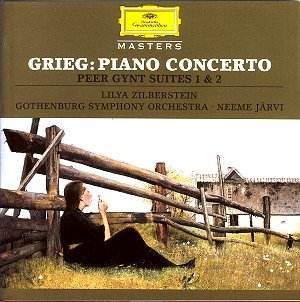As you can see above, this CD is assembled from recordings
made over a fairly long period of time, and which originally formed part
of DG’s 6-CD set of Grieg’s complete orchestral works. What we have here
are his two most popular works – the Piano Concerto and the first Peer
Gynt Suite – plus the slightly less familiar Peer Gynt Suite no.2
and the delightful Nordic Melodies for strings. This makes
a pretty appealing package, especially as the level of performance is
very high.
Don’t expect a mind-blowing version of the concerto.
It’s one of the drawbacks of the piece that, because it’s so well-known,
pianists feel they must at all costs ‘say something new’. Zilberstein
and Järvi resist that temptation, and, hey presto, the concerto
does come up sounding fresh and unmannered. There is probably
room for greater characterisation of the music here and there, most
of all in the finale, where the sense of bravura is closest to the surface.
But generally, Zilberstein gives an honest account of the piece, with
a magically expressive restraint in the lovely slow movement. Järvi
draws very fine playing from the Gothenburg Orchestra, and most of the
significant details come over beautifully. One disappointing moment
of unsatisfactory balance comes in the finale; the flute introduces
a glorious new lyrical melody, track 3, 2:40. As the melody rises to
its peak, the accompanying instruments are allowed to grow too heavy
so that the flute is momentarily lost. Fortunately, misjudgements of
this kind are rare, and the performance as a whole is a successful and
idiomatic one. Not a reading to change your whole view of the piece,
perhaps, but stylish and convincing nonetheless.
The two Nordic Melodies are a real find, and
are typical of the composer at his best. We quite naturally think of
Grieg as being first and foremost a composer for the piano. But he had
an unsurpassed feeling for strings, too, as the scoring of these pieces
demonstrates. The first, titled ‘In Folk Style’ has a haunting and melancholy
melody reminiscent of Solveig’s Song, and features those sliding
chromaticisms so typical of the composer, and which meant so much to
Grainger and Delius. The second Melody is in fact two short pieces
for the price of one, beginning thoughtfully and expressively with the
unpromisingly titled ‘Cow Song’, then moving up a couple of gears for
the jolly ‘Peasant Dance’ complete with tuning-up effects at the outset,
bass drones, and heavy gallumphing folk-rhythms. So what we have, in
effect, is a delightful short three-movement suite for strings, played
here with affection and panache.
Järvi does the Peer Gynt suites superbly;
he understands this music inside out, knowing how to bring out its colour
and vitality without distortion. This is surely the most moving version
of Åse’s Death on disc, the tempo allowing the music to
flow naturally, and banishing any possibility of melodrama. Similarly,
his pacing of In the Hall of the Mountain King is masterly, holding
the music back until you can feel the orchestra straining at the leash,
and building to a climax that is all the more thrilling because of the
restraint beforehand. If you don’t know the second suite, you are in
for a treat; the first movement, The Abduction of the Bride,
contains one of Grieg’s finest brooding melodies, while of course Solveig’s
Song is one of his most celebrated compositions.
For anyone looking for a coupling of the Piano Concerto
and the first Peer Gynt suite, this issue is going to be very
hard to beat. And it brings the bonus of the less familiar music that
will surely appeal strongly to any lover of Grieg. The recording is
mostly more than acceptable, though rather too heavy in the bass for
the Nordic Melodies.
Gwyn Parry-Jones


